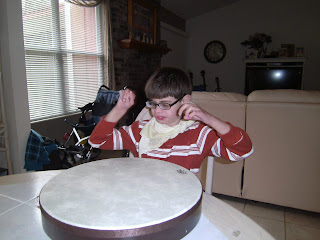Where do I start? In hopes of not sounding too Pollyanna with my resuscitated optimism, I'll begin with the bad. It was raining when we got there. Pouring. Lightning. Melody and I are doing a version of the Atkins diet (a slightly high fasting blood sugar of mine resulted in doctors orders for a low carb summer). We'd exhausted our supply of road food and needed a meal, so we ate an overpriced Hilton restaurant salad and tried to make the best of it. Not easy. We were still hungry at meals end.
When it looked like the four of us would be trapped in the hotel room indefinitely due to storms, she complained that she wanted to go home. I kinda lost it at that point. I slammed a drawer and told everyone that I was trying my best to make sure we all had a good time, but dammit, I'm here for the conference! Maybe I should have come alone! They all got cheerier after my outburst.
We sat in the hot tub outside while the cool rain sprinkled down on us (it was really nice, refreshing, until more lightning flashed and we had to run inside). We ate the nuts I packed, and watched a movie until we fell asleep.
The rain cleared. We swam and ate less expensive food outside by the pool. We calmed down and went with the flow a little bit more. We found our groove.
Saturday afternoon while I was waiting for a session to start (something about balancing the hemispheres of the brain) a woman struck up a conversation. I thought she was a presenter because she was alone and not dressed in shorts. Turns out, she's a disability attorney, former ESE teacher, and mother of 3 kids with disabilities.
Her words, observations, suggestions and support altered my thinking in important ways. She was shocked that in Florida he's denied speech services because of his low cognitive level.
"How do they KNOW what his cognitive level is?" She was pissed. Remember, she's an attorney AND a former special ed teacher.
I told her that after listening to the last workshop on autism, I'm thinking of transferring him to a private school that will give him better communication tools. She gave me a step by step plan for keeping him in public school but in a placement that works for him. She said it's obvious to her after a short time of being with Daniel that he's "on the spectrum."
I knew that, but I've always been hesitant to move him from a classroom where they work so hard on physical skills and into one where there are kids who have behavior issues. Daniel can't jump up and defend himself. I'm rethinking that. I don't want him to one day be able to express what he's thinking/feeling and hear that he hated school. That he felt trapped. He's thirteen, and his remaining time in school is limited.
I met a man with autism who gave a presentation that day. I'd already talked to him in the expo hall and bought one of his books. The talk was comprised of stories. He called it "Autism Across America" and he shared some of his experiences with other autistic people that he's encountered around the country.
The next day when Daniel and I were sitting by the pool in the little cabana restaurant, he sat down with us. At one point, Dan was covering his ears.
"What's wrong? Is the music bothering you?" I asked.
"It's the wind," our friend offered.
Daniel looked up, smiled and clapped as if to say, "YES! He got it! Someone who speaks my language!"
"To an autistic person the sound of eyes blinking can be painful."
I laughed.
He said, "I wasn't trying to be funny. Although, I do have several jokes I can tell."
He went on to share a few of his "adapted jokes". Some former blonde jokes with just enough details changed so that they applied to autism. Funny guy, and very smart.
When I asked him if he knew of William Stillman, a man with Aspergers who writes and lectures, he said, "There are a lot of people who do what I do. I know some of them, but I don't know all of them."
I felt stupid.
Then I said, "One of the things I learned from Stillman is to alway presume intellect."
He thought for a split second and said, "I would disagree with that. I'd have to say that I presume nothing."
Touche. Again, this man was on his intellectual toes. (Although I still maintain that presuming intellect with a non-verbal person is much better than the opposite, which we encounter all of the time).
Daniel and I weren't the only ones making friends. My sixteen year old met a teenager whose brother has Down Syndrome. We saw them in the pool together the first morning there. That afternoon, they hung out and he even convinced her to go down the slide (she's always had a fear of them). From then on, they were friends.
Right up until our hotel check-out there were unexpected conversations, connections and a general feeling of community. Before loading the van, I sat and talked with a woman, her disabled son and his grandmother. That brief conversation helped us both. It reminded me of how important it is to be out there making friends, finding other people who are living this life. It was good. Very good.
















